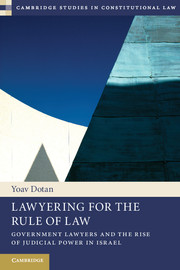 Vol. 25 No. 3 (March 2015) pp. 43-44
Vol. 25 No. 3 (March 2015) pp. 43-44LAWYERING FOR THE RULE OF LAW: GOVERNMENT LAWYERS AND THE RISE OF JUDICIAL POWER IN ISRAEL by Yoav Dotan. Cambridge: Cambridge University Press. 2014. 214 pp. Paper $34.99. ISBN: 978-1-107-62590-7.
Reviewed by Martin Edelman, Professor Emeritus, Political Science, University at Albany; Adjunct Professor, Hunter College, CUNY. ME354@albany.edu.
Twenty years ago, leading members of the International Political Science Association’s Research Committee on Comparative Judicial Studies published the landmark book, THE GLOBAL EXPANSION OF JUDICIAL POWER. In the book under review, Yoav Dotan clearly demonstrates how the accuracy of that assertion—at least in Israel—depends upon the work of lawyers representing the government in public law litigation.
The analysis starts, as it must, with the structure of the Israeli civil court system. One part is quite unexceptional. The Supreme Court, as the final, authoritative, interpreter of the law of the State, has full appellate jurisdiction on the procedure and substance of criminal, civil, and administrative cases in that system. Another part of the Israeli Supreme Court’s jurisdiction is quite distinctive. It exercises an equity jurisdiction both as a court of first instance and on appeal. In this capacity, sitting as the High Court of Justice (HCJ), it deals with matters in which it may be necessary to grant relief “in the interest of justice.” In its capacity as the High Court of Justice, the Israeli Supreme Court functions as the first and last instance and oversight against public agencies (p. 23).
Any person in Israel proper or the Administered Territories (occupied by Israel since the 1967 War) who has reason to believe that a particular public agency (including the military) has denied their legal rights can petition the High Court of Justice for relief. The petition can be submitted by a layperson; no lawyer is required at any stage. A single judge reviews the petition. The court is able to issue a variety of orders for either immediate relief or further proceedings before a panel of justices. Thus the Supreme Court of Israel, as the High Court of Justice, functions as a trial court for administrative matters. It is doubtful “whether there is any other Supreme Court around the world to which access is as easy as the HCJ” (p. 29).
This jurisdictional arrangement has permitted the Supreme Court functioning as the High Court of Justice to change its focus over time. In the early years of the State, the Justices were necessarily concerned with establishing the Court’s authority by generating respect for its decisions. They were aware that in Israel’s turbulent domestic and international situation, appeals to practical necessity could be used to ignore or evade court orders. Therefore early Supreme Court decisions were characterized by a highly formalistic legal style, narrow interpretations of statutes and precedents and deference to decisions of the government. By the 1980s, however, the Justices had come to see themselves as the guardians of the rule of law. The Court decided “when there is a suspicion of serious governmental violations of the principle of the rule of law, any person is entitled to bring the petition into court, regardless of their personal interest in the outcome of the litigation” (p.37). That radical expansion of its jurisdiction, along with such other features as extraordinary easy access “brought about a process of an almost complete judicialization of the Israeli bureaucracy and political processes alike” (p. 45). [*43]
To make this expansion of judicial power a reality still required a mechanism to implement the HCJ’s rulings. What makes Prof. Dotan’s book so noteworthy is its complete, detailed description of that process. It is largely the work of the government lawyers in the High Court of Justice Department (HCJD) within the Office of the Attorney General. Unlike the situation in many other countries, the Israeli Attorney General is not a politician and makes independent decisions on matters of law enforcement, litigation, and binding legal advice to governmental agencies. This provides a shield of independence for the lawyers in the HCJD.
Reflecting the changed perspective of the High Court, the lawyers for the HCJD have come to see themselves as more than the litigators for government agencies. Using interviews and empirical data, Prof. Dotan demonstrates how they have come to function as virtual extensions of the High Court—as lawyers whose primary commitment is to advance the rule of law as formulated by the justices.
The lawyers have extended the power of the HCJ by a variety of means. They have reduced the heavy docket pressure on the HCJ by performing semi-adjudicatory functions. By formulating out-of-court settlements, they have enabled the Court to expand and diversify its judicial remedies. By overseeing agency implementation of Court decisions—by utilizing the Attorney General’s legal authority over governmental agencies—the HCJD has expanded the High Court’s ability to issue orders that have sometimes transformed the substance of government policies. Prof. Dotan conclusively demonstrates that the expansion of judicial power in Israel could not have happened without the closely coordinated efforts of the government lawyers in an executive agency, the High Court of Justice Division within the Office of the Attorney General.
This is what makes LAWYERING FOR THE RULE OF LAW such a remarkable book. Court orders are not self-enforcing. Without the willingness and ability of executive agencies to ensure compliance, judicial decisions have limited impact. Evasion has happened throughout the world, including Israel. The one weakness in Prof. Dotan’s study is the omission of the times that well-entrenched political and bureaucratic forces—such as the Orthodox Jewish communities—have been able to resist or retard judicially mandated change. Still, from a system-wide perspective, Prof. Dotan illuminates how the Israeli Supreme Court has become such a significant, powerful institution. He has written a book deserving close reading by all students of judicial politics.
REFERENCES
Tate, C. Neal and Vallinder, Torbjorn, eds. 1995. THE GLOBAL EXPANSION OF JUDICIAL POWER. New York: New York University Press.
***************
© Copyright 2015 by the author, Martin Edelman.